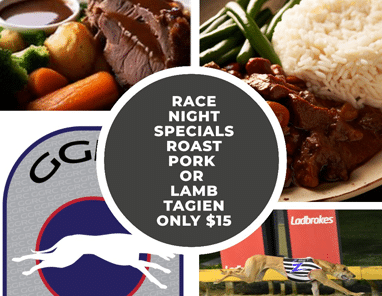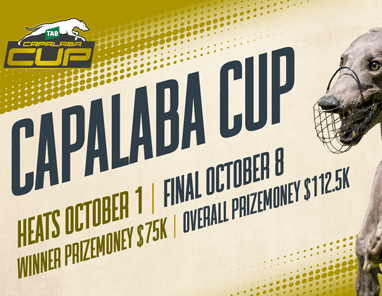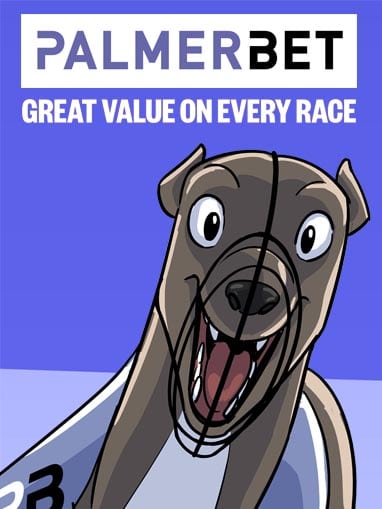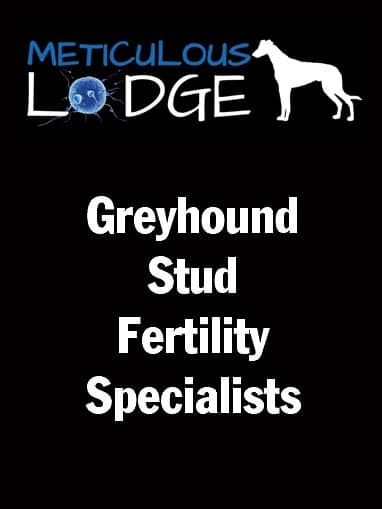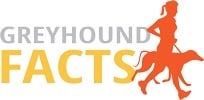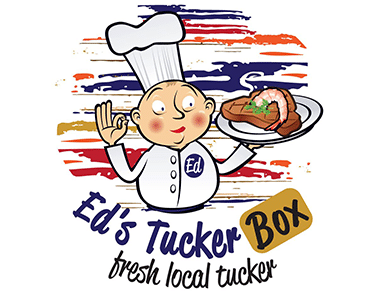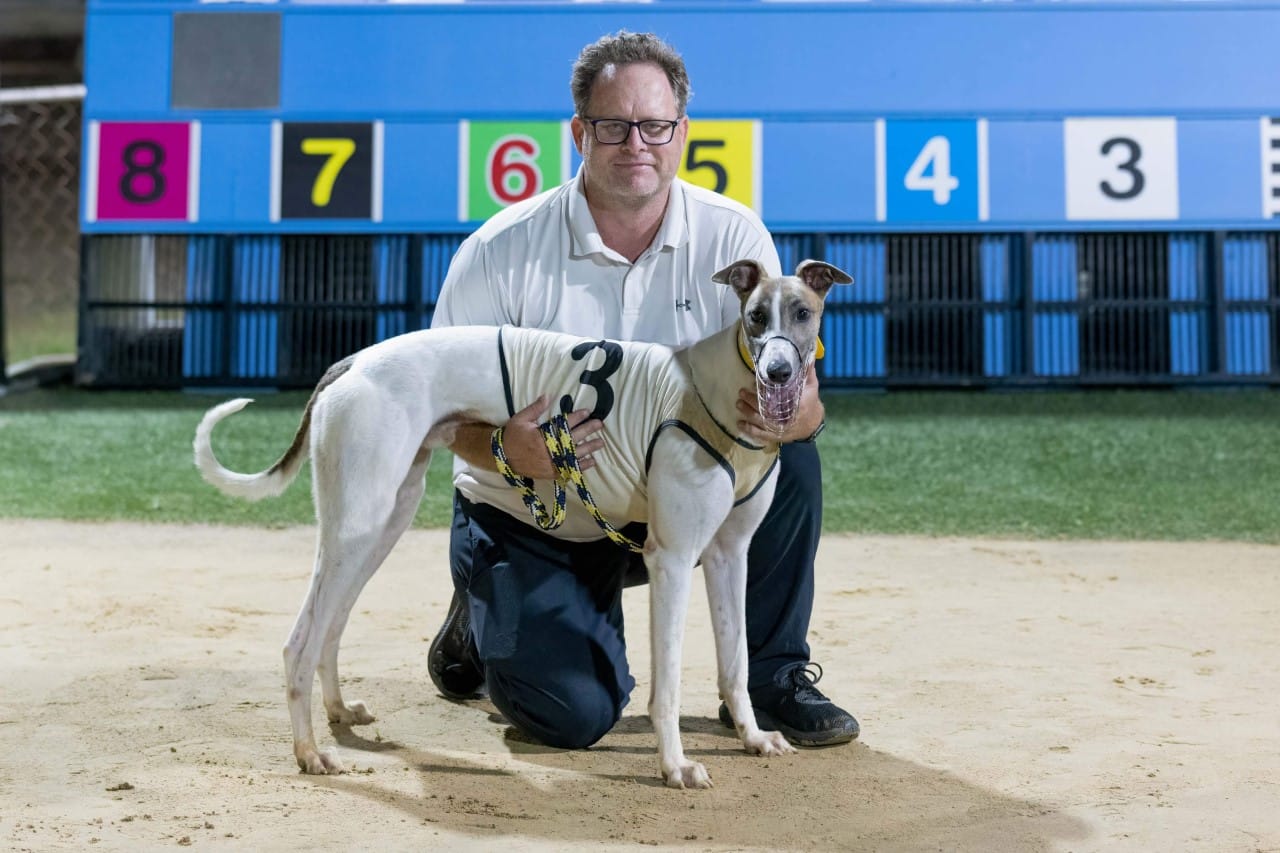
Caption: Townsville trainer Scott Atkinson with recent winner Memory Lane. (Photo: Louise Partland)
By MIKE HILL
SCOTT Atkinson is hoping a kennel move will help make him a better trainer.
The ex-Army electrician, who we feature this month in the Trainer’s Column, has accepted an offer from leading Townsville mentor Brad Belford to join him at his Gunlow base.
“It’s a great opportunity to learn from the best,” Atkinson said.
“Brad’s been around greyhounds all his life. He’s the top man up here.
“He has so much experience, I felt I had to take up the opportunity.”
Atkinson, 41, who picked up the lead and collar four years ago after leaving the Army with a medical discharge following 15 years of service, will take over an eight-kennel block on Belford’s property.
“Brad has two kennel blocks – a large and a small,” he said.
“I have seven dogs in work and I will be taking the small one.”
Atkinson, married with two teenage daughters, has been training for only a few years, although he’s been involved in greyhound ownership for some time.
Through a mate in Victoria, he’s been in several syndicates, experiencing early success.
“Our first dog Cooper Scooper won nine races, including at The Meadows and Sandown Park in Melbourne,” he said.
“Not a half-bad start.
“It gave me the push to get more involved and when I left the Army in 2018 I started helping (trainer) Rob Lound.”
After six months Atkinson decided to give the training caper a go and it’s been a steady learning experience ever since.
Success has been building from a meagre two wins in 2019, to 17 victories in 2020, 40 last year and so far this year he’s led in 31 winners.
“Last year was by far my best and I’m starting to have a reasonable season this year,” the trainer said.
His current star performer is the ex-Victorian sprinter Alert, previously trained by Correy Grenfell at Anakie.
Alert arrived in the north in late July and from 12 starts for Atkinson the son of Orson Allen has won six, including four on the trot, as well as two seconds.
He’s expecting to move from his current base at Bohle Plains to nearby Gumlow in coming weeks.
Atkinson said his youngest daughter Chelsea, who loves the dogs, had just received her handler’s licence.
“She really happy to be doing it, but disappointed she hasn’t handled a winner yet,” he said.
“I’ve just told her to be patient … it will come.”
1: How and when did you get involved in greyhound racing?
A: After I was medically discharged from the Army in late 2018 I asked Robert Lound if he needed any help. He was happy for me to help out and after six months I decided to have a crack at training myself.
2: Who has been the greatest influence on you as a trainer?
A: In a way it would have to be my Dad who passed away a while ago. He loved racing of all codes and loved the dogs. I guess in the end it rubbed off on me. I remember him telling me as a young fella when it came to the dogs you either want the inside two or the outside two. I’ve also had a lot of help and advice from local trainers along the way. Rob Lound, Brad Belford, Greg Pickard, Tony Parker, Harold Hovi, Heath Ardle, Greta Thomson and the late Emma Bryant have always been willing to give advice and encouragement. I also like to ask Tommy Tzouvelis questions when he visits each year for the Cup carnival. Club president Garry Health has been very encouraging and always asked how my dogs are going.
3: At what age do you start preparing a pup for racing?
A: I like to get a pup in after they have their spell from the breakers around the 15-16-month mark.
4: How long does it take to prepare a pup for its first race?
A: It all depends on the dog. If it’s one thing I’ve learnt in my short time as a trainer is that you need to have patience when it comes to young ones. This can be challenging at times as you just want to get them to the track. Generally, around the 18-20 month mark is when I like to see them racing. The girls can take a little longer and the breeding can be a factor. For example, I found that Sh Avatar dogs seem to mature a bit later, but they can be handy if you take your time with them.
5: What makes a good pup?
A: I would like to say it’s their breeding, but that’s not always the case. Although breeding is a major factor, you also just want a pup that first and foremost chases hard. If you have that then that’s half your problems gone. Other things can be worked on, such as box manners and fitness, but if you have a pup that doesn’t want to chase you can be fighting a losing battle.
6: Do you do anything special when preparing a young dog for its maiden compared to a seasoned performer?
A: Not really. I like to keep it all the same. The only difference with a maiden is I like them to trial with at least three other dogs before I start them.
7: Do you have a set routine for all your greyhounds or do you vary training for individual runners?
A: Generally, it’s the same routine for all. I’ve often received dogs from other trainers who have said the dog won’t do this or doesn’t like that. That soon changes when they come to me. You just have to tell them this is what I do so you will be doing it too.
8: Do you have any unique or unusual methods you would like to share about training?
A: I don’t think so. I like to stick to the basics. Just recently I started letting the dogs have a play with the squeaker the day before racing. It seems to have worked on a few of them, so I will continue to do it.
9: Do you swim your dogs as part of your training regime?
A: Sometimes I will take them to the beach for a splash around. It’s more so to get them out of the kennel to have a bit of a break and a look around.
10: How frequently do you like to race your dogs?
A: If they are a 500m dog I like to only race them once a week. For the short courses I tend to have them run three races in a fortnight.
11: What’s your training routine for dogs between races?
A: Mostly it’s on the walker between races. If they are a once-a-week dog, then a free run with another down the straight track is on the cards.
12: Do you do all muscle work on your dogs and treat all injuries?
A: Generally, yes. I’m no expert at all on this but I’m getting better with it. If there is something I can’t pick up or is a bit out of the ordinary, Brad (Belford) is always happy to help and offer his thoughts or suggestions.
13: Do you treat all injuries to your dogs yourself?
A: Yes, again though Brad will help if I ask. Unfortunately, I’ve experienced two major injuries and they both happened to the best two race dogs I have had.
14: Which is the best greyhound you have trained?
A: My mate Sean, who I had owned dogs with before, sent me one last year that was flying for me. His name was Canya Go Wild. He was super for me, winning six from 13 before he unfortunately broke a hock. It was heart-breaking for me when it happened. Luckily it was fixable, and the vet did a really good job on him. He stayed at home with me for a while before he was right to go to GAP. He has not long ago been adopted. He seems to be very much loved by his new owners and since he has been adopted I have been able to chat with them about how he’s going.
15: What do you consider is the best greyhound track in Australia and why?
A: While I haven’t raced any of my own, I love going to The Meadows. You can get so close to the track. I’m also hoping to be able to take some to Albion Park before it’s closed and racing moves to the new complex near Ipswich.
16: What does the industry need most going forward?
A: I think we are in a really good position in Queensland and in my short time I have seen the industry grow and grow. I feel that more could be done for retired dogs. While GAP is fantastic, it can sometimes take a while to get the dogs into it. I love what NSW has done by building a retirement facility and I think something similar in Queensland would be great.
17: What is the best advice you could give someone just starting out as a trainer?
A: Ask questions, listen, research and don’t underestimate the importance of diet for your dog. Finding a good kibble and meat supply can make all the difference.


